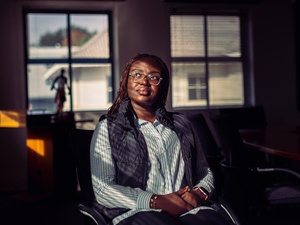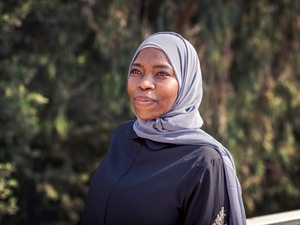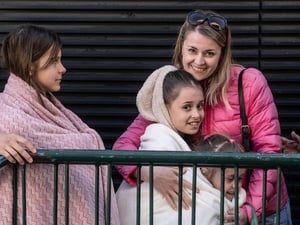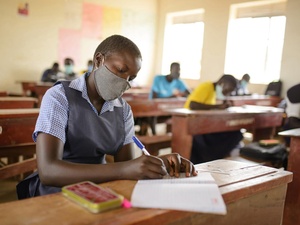German scholarship gives Somali refugee "the best you can get" - education
German scholarship gives Somali refugee "the best you can get" - education
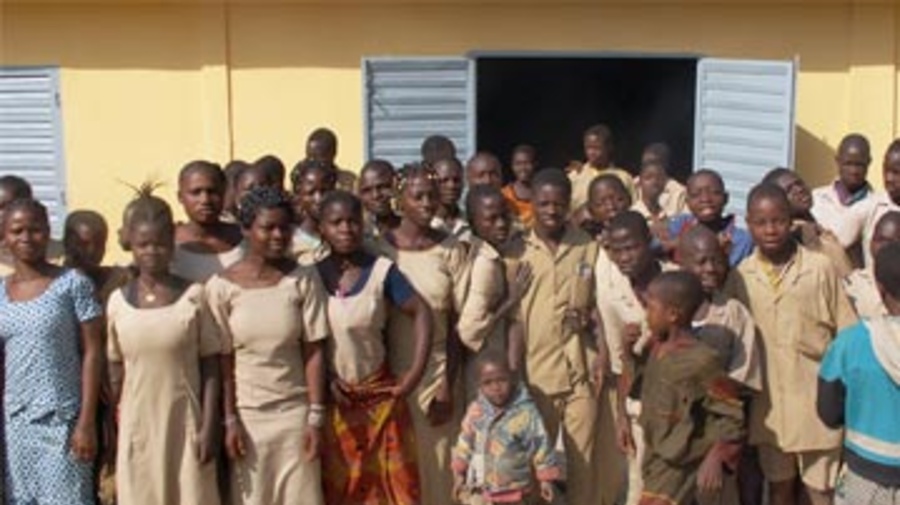
Refugee secondary school students in developing countries, like these in Guinea, have the chance of a university education under a DAFI scholarship if they achieve excellent marks.
CAIRO, Egypt Aug. 7 (UNHCR) - Proudly looking at this graduation pictures, Mohamed recalls with joy the night this summer when he received his bachelor's degree. It would have been perfect if only his family had been around him to celebrate. But still, he had other reasons to cheer.
Mohamed, a 25-year-old Somali refugee is one of five refugees in Egypt to receive a scholarship over the last four years through UNHCR's annual DAFI scholarship programme, more formally known as the Albert Einstein German Academic Refugee Initiative. The scholarship, funded by the German government, gave Mohamed the opportunity to study at a private university in Egypt and obtain a degree in economics and management.
"It is difficult to be alone and away from family and home especially when you are celebrating milestones," said Mohamed. "My colleagues and friends brought their families and some came from so far away but I was the only student who came alone without family. I was delighted though to see one of UNHCR's staff in Egypt standing next to me celebrating my success. He was my family that night."
Mohamed, whose last name is being withheld for protection reasons, fled war raging Somalia in 2002 when he was 19, after his mother paid smugglers to get him a visa and a passport to leave the country. He was forced to flee after his father, two brothers and a sister were killed and he himself was kidnapped. The remaining family could not afford to leave with Mohamed, but his mother pledged she would also find safety somewhere closer to Somalia and one day they would be reunited.
He arrived in Egypt in September, 2002, alone and when people heard his story, they advised him to visit UNHCR where he learned about the DAFI scholarship programme. "I am trying hard because I want to change my life, help myself and my family, and the scholarship provided me with the best that you can get: education," said Mohamed.
During the years Mohamed spent studying at the 6th of October University in Cairo, he had to get used to different sounds and a different lifestyle.
"In Somalia, your ears are used to screaming, crying and your eyes have to get used to seeing tears on everyone's face," said Mohamed. "If it is not your family, then it is your neighbours and you cannot do anything to help most of the time. But here in Cairo, there are different vibes and sounds.... It is the vibes of a safe place."
Throughout his four years at university, Mohamed studied management and economics but he also had hands-on training in research and in designing public awareness campaigns that will one day benefit his people when peace prevails and he returns to his homeland.
"From combating tobacco to malnutrition among children to designing public health messages on HIV and tuberculosis, I have had education relevant to the needs of my country and I am determined to put it to use," said Mohamed. "I am grateful to UNHCR and the DAFI sponsors for giving me the chance to continue my education. They have given me and Somalia an opportunity for a better future."
Since fleeing Somalia six years ago, Mohamed has not had any communication with his mother, remaining two sisters and brother, but heard recently from a friend that someone saw his family somewhere along the Ethiopian-Somali border. "This is not the first time that we are apart. I was kidnapped in 1998 when I was still a child and when I was released from my kidnappers, I searched for (my family) in the refugee camp where we were living and could not find them for six months," he recalled
He is determined to find them, but in the meantime Mohamed is applying for jobs in Egypt in the hope that he can gain experience and support himself. His long-term plans include applying to universities in the United States, Canada and the UK for post-graduate studies.
Mohamed is one of the lucky few. Many more refugees like him will need help to continue their education in Egypt. Some 31 percent of people of concern to UNHCR are younger than 18, and access to education in overcrowded public schools is quite limited. To support their access to primary and secondary education, UNHCR offers education grants for children who would otherwise be unable to afford to go to school. Last year, more than 6,911 school children benefited from these education grants.
The DAFI scholarship programme is a trust fund provided annually by the German government to UNHCR. It aims to help needy and deserving refugee students who attain excellent results in secondary school to continue their academic studies in developing countries.
UNHCR implements and monitors this programme and has awarded more than 70 DAFI scholarships in Egypt over the last ten years. In 2008, the number of grants available for refugee students in higher education has increased from five to ten scholarships.
By Abeer Etefa in Cairo, Egypt


